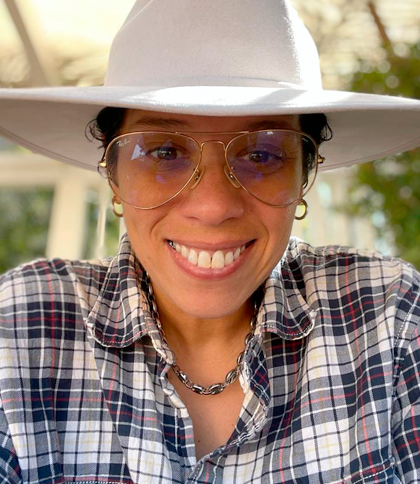The key to achieving representation of Hispanic voices and talent in U.S. productions lies in recognizing that Latinos are integral Americans who bring diverse perspectives and narratives to the table, asserts Mari Urdaneta, CEO of 200% Media.
“Latinos are equally capable of creating content for the wider audience and can introduce fresh storylines and ideas previously unexplored. Our stories are just as American, National, and International as any other good story! In the past, when meeting with networks, we were often redirected to their LatAm department assuming our interest was limited to Latin content due to our ethnicity. Thankfully, in recent years, networks have begun acknowledging our potential in the general market, and hopefully, this trend will continue to amplify Latin voices and talent in their productions,” said Urdaneta.
MORE AND MORE EXAMPLES OF SUCCESS
As references for successful integrations of Latino talent in U.S. productions, Urdaneta highlighted Jenna Ortega and Luis Guzmán starring in Netflix’s hit show, Wednesday. “This show demonstrates that Latino actors can shine in roles beyond Latin-specific narratives, all while showcasing their culture without overshadowing the storyline.”
Additional noteworthy examples feature Eugenio Derbez’s Acapulco by Morgan Wandell and Brandon Brito’s team at Apple TV+, as well as Griselda “by our friends Sofía Vergara, Luis Balaguer, and Eric Newman for Netflix.
“Latinos love supporting one another! By including Latino talent, you can attract new audiences from both the general market and Latin America, who appreciate showing their support. Engagement among Latin audiences becomes more meaningful when they see a variety of characters in media, instead of the limited stereotypes that have been prevalent for a long time,” she added.
GENERALIZATION IS A CHALLENGE
Urdaneta stated that one challenge they’ve faced is communicating to studios the differences between the U.S. Hispanic market and the broader Latin American region. “We emphasize the presence of individual shows like La Voz USA, Argentina, Chile, Mexico, Colombia, Dominican Republic, Ecuador, Peru, and Spain, as each represents unique markets, cultures, and audiences. These diverse markets have distinct approaches to promotion, and it is important not to generalize them simply because they all speak Spanish.”
ENSURING AUTHENTICITY
She said that to ensure authenticity there’s nothing better than going to the direct source. “Incorporating diversity behind the scenes is crucial because the subtle nuances unique to Latinos are what truly bring a Latino story to life. Even audiences unfamiliar with the culture can sense the difference between a generalized portrayal and an authentic one. That said, we also welcome other ethnicities to contribute behind the scenes. This inclusivity can enrich their comprehension of Latino content, which they can carry forward to future projects.”
Urdaneta mentions that they are aiming to include authentic representation of the culture they are portraying throughout the development and filming of their production. “Having a Latino crew does not automatically guarantee a deep understanding of the specific culture depicted, so we strive to have someone on board who can provide that perspective. Moreover, when casting a character from a particular country like Colombia, Mexico, or any other, we make a conscious effort to have them portrayed by talented actors from that specific country rather than just selecting actors who appear Latino. Additionally, we conduct thorough research and seek honest feedback to maintain the authenticity of our production. Fortunately, the partners we have collaborated with have entrusted us to maintain the authenticity of the representation.”
FEEDBACK IS CRUCIAL IN SHAPING FUTURE CONTENT
Urdaneta emphasizes that audiences play a pivotal role in shaping future content that resonates with Latino culture, especially in today’s era when they can readily share their opinions and critiques on platforms like YouTube and social media.

Su Nombre Era Dolores, La Jenn que Yo Conocí
During the filming of Su Nombre Era Dolores, La Jenn que Yo Conocí, Urdaneta advocated for Jenni Rivera’s character to speak Spanglish, ensuring an authentic portrayal of her life. “There were understandable concerns from Univision, known for Spanish content, about potentially alienating viewers by mixing in English. Thankfully we stayed true to our vision and after the first episode aired, discussions on Twitter revealed that many viewers were engaging in English. On Sunday nights, we were a trending topic on Twitter, outperforming major networks such as ABC or FOX in terms of ratings. Even our US Hispanic competitors did not experience a drop in viewership during that time slot. This unexpected response showed that we had reached a new audience that embraced the authentic bilingual approach. Taking this feedback into account, we found it easier to incorporate Spanglish in future projects, all thanks to the valuable feedback from our audience.”
BALANCE
«When asked about how they manage to create a balance for productions that are attractive to both the U.S. Hispanic market and other markets, Urdaneta indicated that the team “is scattered along the 200% spectrum allowing us to strike a balance between Latino and broader audiences”.
Urdaneta, born in Venezuela and raised in Miami; Xianelly Guzmán, a Development Executive at 200% Media, born and raised throughout the U.S. with a Puerto Rican background; and Mónica Vargas, a Development Coordinator, born and raised in Mexico with some years in Texas, each contributes unique perspectives. “We like to discuss ideas within our group to see if it vibes with everyone or if it could lead to a misunderstanding. A recent example was for a show we’re developing, we had the Catrina skull part of the show’s graphics. While some of us thought it gave a cantina vibe, we realized it could be interpreted as a Día de Muertos theme. These sorts of debates ensure our content can appeal to both Latino and broader audiences. We also love working with 200%er teams like Margot Agency who understand these broader audiences.”

